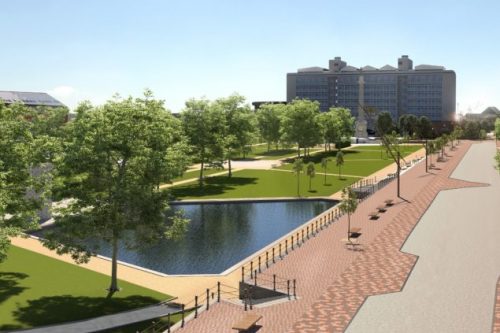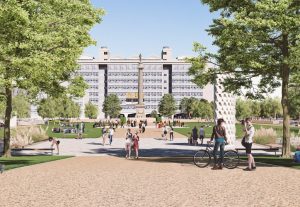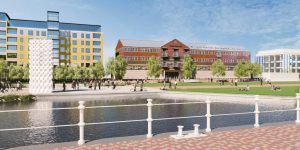Plans submitted for £4.3m city centre regeneration

Hull’s Queens Gardens refurbishment has moved a step closer with its council submitting a planning application for the city centre project.
Plans for the £4.3m regeneration of the historic gardens include improved public access, improvements to the boundary walls, introduction of public artworks and restoration of the Rose Bowl fountain.
The plans also incorporate modern, eco-friendly features, including electric vehicle charging points, plants and trees to increase the gardens’ biodiversity and incorporation of designs and functions that will allow the area to be used for flood alleviation.
Councillor Daren Hale, portfolio holder for regeneration and economic investment, said: “It’s an exciting moment for the project.
“We’ve worked with local groups and also held public consultation events, and I’d like to thank everyone for their valuable comments and feedback.
“The response to the project has been fantastic. I think the whole city is excited to see such an iconic city centre space regenerated and our rich maritime history celebrated.”
The gardens were created in the 1930s by filling in the then Queens Dock, which was once the largest dock of its kind in the country.
The Queens Gardens refurbishment is being funded by Hull City Council. It is associated with the Hull: Yorkshire’s Maritime City project, a cultural regeneration scheme that will protect and celebrate 800 years of Hull’s maritime heritage.
The refurbished gardens will create a link between some of the city’s key maritime heritage sites as part of the £30.2m Hull: Yorkshire’s Maritime City project.
Existing ponds, as well as being refurbished, will be modernised so they can be used as large urban water retainers in the event of heavy rainfall.
They will give relief to main drainage system, creating sustainable urban drainage, taking rainwater that falls on nearby buildings and roofs and channelling under the road, holding in the ponds in Queens Gardens.
Trees will be replaced providing species that will improve the biodiversity of the gardens.
As part of the plans, artists will also create attractive and interactive permanent installations throughout the gardens.
A council spokesman added: “The redesigned gardens will offer a more suitable, large city centre events space that includes amphitheatre-style seating on the garden’s southern edge.
“The plans are sympathetic to those of Sir Fredrick Gibberd, one of England’s most distinguished 20th-century architects who redesigned the gardens in the 1950s.”










